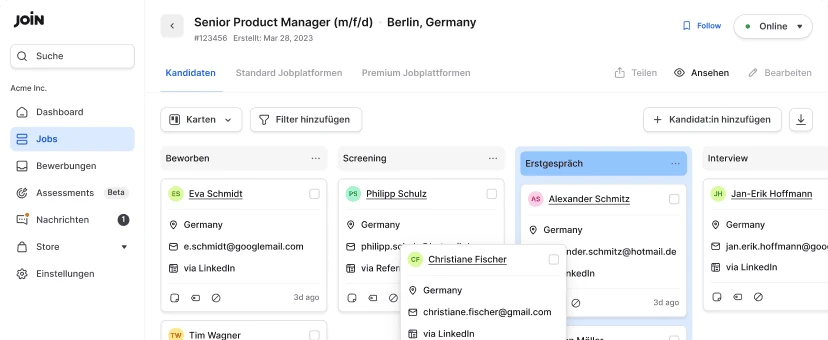What is talent management (and how to get started)
In today’s dynamic business world, successful companies focus more than ever on the talent management process.
Table of contents
- Talent management definition
- Why is talent management so important?
- The talent management program: What’s included?
- The role of a talent manager
- Creating a talent management process in 4 simple steps
Talent management definition
Talent management goes far beyond simply recruiting and hiring skilled workers. It’s a holistic approach towards talent that combines multiple HR disciplines into one. For starters, with talent management, you don’t just strive to find the right people for specific positions in a targeted way. This is the focus of both talent acquisition and recruitment strategies.Suggested read: Talent acquisition vs. recruitmentBut talent management as a concept is also about recognising individuals’ unique skills and long-term potential at an early stage. And it doesn’t end there. A crucial aspect of talent management is to retain these highly qualified and motivated employees by providing appropriate incentives and opportunities. And this can be anything from finding ways to show employee appreciation, to developing a learning and development plan.
Why is talent management important?
By managing your talent this way, you don’t just give employees a job and a pay cheque. Instead, you’re shifting from a company-first to a talent-first culture. Rather than seeing employees just as workers, you actively provide development opportunities to help them grow. Not just within your company, but in their career and as individuals. The consistent implementation of talent management strategies is an investment in the human capital of a company. This investment can pay off enormously because it is often the quality and motivation of employees that determine the long-term success or stagnation of a company. Take this McKinsey survey, where they asked respondents whether implementing a talent management program had improved company performance. The answers showed a clear correlation between talent management and organisational performance, with 99% of companies (yes, that many!) with an effective talent-management program acknowledging it as an effective strategy for attracting and retaining talent. And in times of turmoil (like we saw with the Great Resignation), you can’t hold on to talent tightly enough…The talent management program: What’s included?
You now know that talent management is important for your company. But at this stage, it might still seem a bit broad and vague. Time to change that. There are several talent management models that HR professionals can follow. However, most talent management systems’ essence and main components remain the same. These are the 3 pillars of a talent management program:1. Talent acquisition
You can’t manage talent if you don’t have talented employees on your team. It’s that simple. That’s why talent management’s first main element is identifying, finding, and acquiring talented professionals. To be successful, talent managers must be able to identify employees with special skills or business potential. And once they know what they’re after, they need to know how to source candidates to find and attract them. The easiest way to do this is with the right recruiting tool. Such software offers features like one-click multiposting or a candidate pipeline to make applicant management a breeze. And to better qualify candidates, some tools (like JOIN’s free recruiting software) even offer in-app candidate assessments and tests.
2. Talent development
It’s not enough to identify talent. Talent relationship management is equally important. This part is all about nurturing and developing talent so that they can make full use of their abilities. This includes offering skills training programmes, mentoring, work coaching, or giving them special assignments and projects. And this is a part that employers too often neglect. Granted, training and development generally aren’t cheap. This may depend on your industry, but chances are that a one-day course can easily cost your business a thousand euros. Nevertheless, the importance of actively supporting your employees’ career development can’t be underestimated. Not only will employees be more valuable for your business as they gain more knowledge, but it also gives them a reason and motivation to stay with your company. Which leads to point three.3. Talent retention
Having the best talent on your team doesn’t mean anything if they leave again after a few months. That’s why a successful talent management process includes strategies to retain these employees in the long term. Offering training opportunities is already a great start, but there’s much more to it. From attractive compensation packages to other incentives and employee benefits (like flexible working). Furthermore, employee retention highly relies on building a company culture that individuals want to be a part of. To do so, you’ll have to further invest in things like team-building activities or creating a psychologically safe working environment. Not only will all of these strategies help you retain top talent more easily, but it will simultaneously strengthen your employer brand. This, in turn, will help you more easily attract top talent to your company in the future.Recommended reading: Excelling at employee retention: An interview with Culture Amp
The central role of a talent manager
Talent managers play a central role in the talent management process and are usually part of the HR department. You can read about other roles within the HR team and which ones you should hire in our article: Who should you hire for your HR team? The term “talent manager” may sound to some simply like a modern version of the traditional HR manager. But in reality, the role of a talent manager is far more complex and strategic. A talent manager is not only responsible for recruiting. Rather, they take on the role of a navigator in the dynamic sea of the talent landscape. It’s about finding the right balance between the current needs of the company and the ever-changing world of work. Talent managers not only identify future leaders and professionals but also develop strategies to nurture, develop, and retain these talents in the long term. That’s why they need to have both a deep understanding of the company culture and strategy and a good sense of human potential and needs. An effective talent manager has one hand on the pulse of the company and the other on the pulse of the workforce. His or her ability to synchronise and optimally align these two worlds can make the crucial difference between dynamic company growth and stagnant development.
Creating a talent management process in 4 simple steps
A well-thought-out talent management model goes far beyond simply recruiting and hiring skilled workers. It manifests itself as a strategic, ongoing initiative that reaches deep into the structure and culture of a company. The main goal? To recognise and harness the immense potential of human capital. In the following four steps, we’ll have a closer look at how to put this process into practice.Step 1: Strategic human resource planning
Strategic workforce planning is the foundation of successful talent management. It requires a forward-looking view of the company’s future staffing needs. This is not just about filling short-term vacancies. Rather, it is about analysing which competencies and skills will be needed in the coming years to achieve the company’s goals. This proactive approach ensures that the company always has the necessary talent and remains competitive.Step 2: Employee assessment
Effective talent management requires a continuous assessment and feedback culture. Regular feedback meetings and performance reviews offer the opportunity to follow the development of employees. It helps to recognise their strengths and weaknesses and to take targeted measures for their further development. Moreover, through these discussions, potential problems can be identified and solved at an early stage before they become major challenges.Step 3: Succession planning
No one is irreplaceable, but the sudden departure of a key person can have a significant impact on a company. Therefore, it’s essential to always have a “Plan B” up your sleeve. Succession planning ensures that there are qualified candidates who can take over a key position in the event of an unexpected departure. This not only reduces potential downtime and associated costs but also ensures continuity in critical business areas.Step 4: Culture and commitment
Company culture plays a crucial role in talent management. A positive, appreciative, and inclusive culture not only promotes employee engagement and satisfaction but also attracts new talent. A company that is known for its positive culture is perceived as an attractive employer, which in turn facilitates talent acquisition and strengthens employee retention.Talent management moving forward
Talent management is not just a buzzword or a short-term fad. It’s a critical strategy for companies that want to succeed in today’s fast-changing business world.Take the test: [QUIZ] What’s your management style?By properly identifying, developing, and retaining talent, companies secure their future and create a competitive advantage that’s hard to beat. That’s why it’s essential that companies invest not only in technology, but also in their people. An effective talent management strategy is the key to success. Want more inspiration and helpful resources? Check out:
Frans Lelivelt
Frans is JOIN's multilingual Senior Content Manager. His main topic of interest in the recruitment space is DEI and how companies can reduce their (unconscious) biases to make the world of work a fairer, kinder place for everyone. Outside of work, he tries to do the same for animals, spending much of his spare time in the kitchen preparing plant-based feasts.


